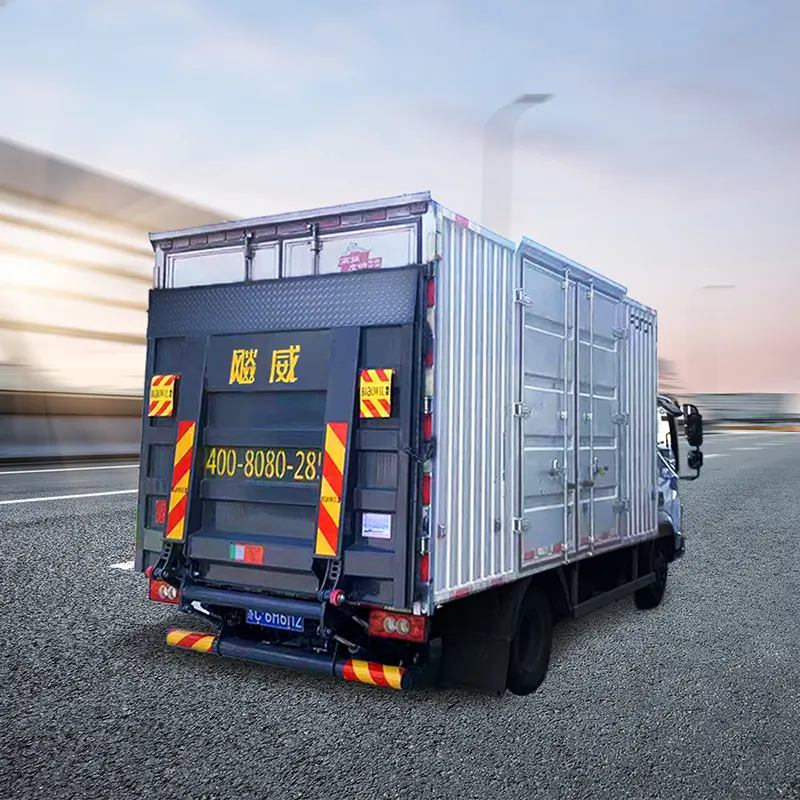Qu'est-ce qu'un hayon élévateur?
Un ascenseur de queue (Aussi appelé un levage de queue hydraulique ou un levage de queue de levage) est un dispositif de chargement et de déchargement hydraulique installé à l'arrière d'une camionnette, camion, ou véhicule logistique. Sa fonction principale est de soulever la cargaison du sol à la hauteur du compartiment de cargaison du véhicule à travers un système hydraulique, ou pour abaisser la cargaison du compartiment de cargaison du véhicule jusqu'au sol, réalisant ainsi un chargement rapide et un déchargement de cargaison. Les ascenseurs de queue sont largement utilisés dans les industries de la logistique et des transports, Surtout dans les scénarios où la cargaison grande ou lourde doit être fréquemment chargée et déchargée.
je. Caractéristiques principales des ascenseurs de queue:
1) Conception légère: Les soulèvements de queue modernes utilisent généralement des matériaux légers à haute résistance pour réduire leur propre poids et augmenter la capacité de charge du véhicule.
2) Système hydraulique: Le lifting de la queue est équipé d'un système hydraulique, qui utilise une pompe hydraulique et un cylindre hydraulique pour obtenir le levage et la baisse de la lifting de la queue. Il est simple de fonctionner, Économiser du temps et des efforts.
3) Contrôle intelligent: Les relevés de queue avancés sont équipés d'un système de contrôle intelligent, qui peut réaliser des fonctions telles que le soulèvement d'un bouton, nivellement automatique, et surveillance à distance, Améliorer davantage la commodité et la sécurité de l'opération.
4) Protection contre la sécurité: Les ascenseurs de queue sont généralement conçus avec de multiples mesures de protection contre la sécurité, comme la surface anti-glissement, protection anti-surcharge, bouton d'arrêt d'urgence, etc., Pour assurer une opération sûre dans diverses conditions de travail.
5) Durabilité: Le matériau et la conception structurelle de l'ascenseur à queue ont été spécialement traités, avec une excellente résistance à la corrosion et une résistance à l'usure, Convient pour divers environnements durs.
2. Scénarios d'application des ascenseurs de queue:
1) Logistique et livraison express: Dans les industries de la livraison logistique et express, Les ascenseurs de queue peuvent améliorer considérablement l'efficacité du chargement et du déchargement des cargaisons, réduire le temps de fonctionnement manuel et l'intensité du travail.
2) Commerce électronique transfrontalier: Pour les entreprises de commerce électronique transfrontalières, Les ascenseurs de queue peuvent accélérer le traitement et la livraison des commandes et s'assurer que les marchandises sont livrées aux clients en temps opportun.
3) Logistique de la chaîne du froid: Dans la logistique de la chaîne du froid, Les ascenseurs de queue peuvent aider à charger et à décharger rapidement et à décharger les aliments réfrigérés et surgelés pour maintenir la qualité et la fraîcheur des marchandises.
4) Transport des matériaux de construction: L'industrie de la construction doit souvent transporter de grands matériaux et lourds. Les ascenseurs de queue peuvent effectuer efficacement les tâches de chargement et de déchargement et d'améliorer efficacement l'efficacité des chantiers de construction.
5) Transport des fournitures médicales: Le transport d'équipements médicaux et de fournitures nécessite une réponse rapide. Le lifting de queue peut être chargé et déchargé rapidement et en toute sécurité en cas d'urgence, Amélioration de l'efficacité de la logistique d'urgence.
III. Avantages de l'ascenseur à queue:
1) Améliorer l'efficacité: Raccourcir considérablement l'heure du chargement et du déchargement des marchandises, et améliorer l'efficacité du transport logistique.
2) Réduire les coûts de main-d'œuvre: Réduire la dépendance à l'égard des opérations manuelles, réduire l'intensité de la main-d'œuvre et les coûts de main-d'œuvre.
3) Améliorer la sécurité: Grâce à plusieurs conceptions de protection contre la sécurité, Assurer la sécurité du processus de chargement et de déchargement et réduire les accidents.
4) Adaptabilité forte: Convient pour divers types de véhicules et divers besoins de l'industrie, Avec une large adaptabilité.
En tant que partie importante de l'équipement logistique moderne, Le développement et l'application de la portance de queue sont d'une grande importance pour améliorer l'efficacité logistique et l'optimisation des processus logistiques.
